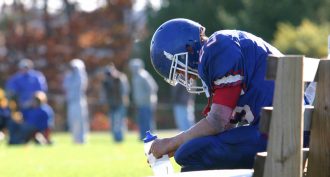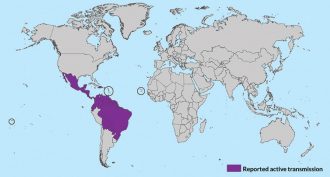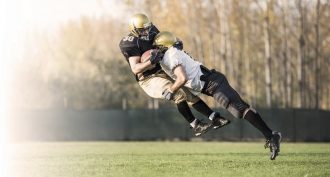Brain
-
 Brain
BrainLeft brain stands guard during sleepovers
Part of the left half of the brain remains on alert while the rest of the brain and body snooze.
-
 Health & Medicine
Health & MedicineHeaded to a concert this summer? Pack earplugs
Wearing earplugs at concerts and other loud events may prevent hearing loss and permanent ear damage, a new study suggests.
-
 Health & Medicine
Health & MedicineExplainer: When loud becomes dangerous
Many people don’t realize that sounds — even those of the music they love — can prove harmful when they get too loud.
By Janet Raloff -
 Health & Medicine
Health & MedicineCool jobs: Brainy ways to battle obesity
Scientists from different fields are tapping into connections between food and the brain to help people fight obesity and overcome the urge to overeat.
-
 Brain
Brain‘Mindfulness’ defuses stress in classrooms and teaching
The science behind mindfulness shows that both teachers and students can benefit from a bit of focused attention.
-
 Brain
BrainWhen smartphones go to school
Students who use smartphones and other mobile technology in class may well be driven to distraction. And that can hurt grades, studies show.
-
 Brain
BrainEarly intro to sign language has lasting benefits
Children introduced to sign language as babies performed better on mental-processing tasks at age 12 — and as adults — than did people who learned sign language at age 3.
-
 Health & Medicine
Health & MedicineConcussed brains need time to heal
Researchers working with mice found that allowing the body to rest after a concussion gave brain cells time to heal and reconnect with each other.
-
 Health & Medicine
Health & MedicineVaping may threaten brain, immunity and more
New studies of e-cigarette vapor in animals and human cells find new risks to gene activity, behavior and male sperm.
By Janet Raloff -
 Health & Medicine
Health & MedicineZika worries go global
The World Health Organization says the devastating birth defects and brain disorders linked to the Zika virus are an international health emergency.
By Meghan Rosen -
 Brain
BrainScientists Say: Amusia
When you can’t carry a tune, you might have amusia, a brain disorder where people can’t tell one note from another.
-
 Health & Medicine
Health & MedicineToo many football hits can change the brain
A former football player who died in his mid-20s had serious Alzheimer's-like damage that doctors are now linking to repeated concussions.